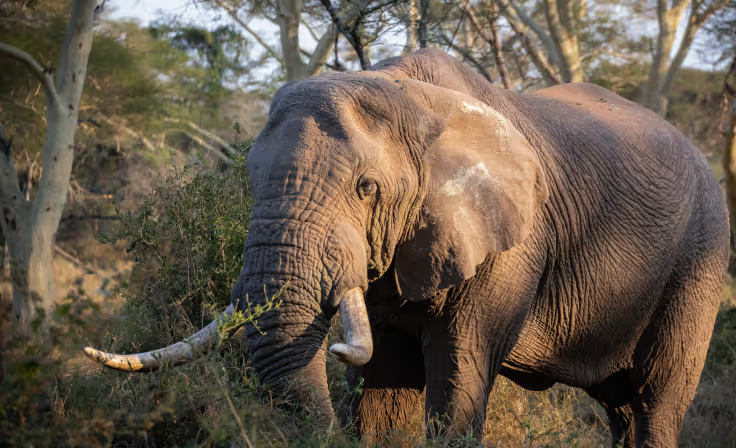Conservation-focused Safari: Travel with purpose!
Join our experts in the field to support award-winning wildlife conservation efforts at renowned nature reserves.
Book NowThis bespoke Wildlife Conservation Safari is for those who wish to join our experts on the ground, participate in award-winning conservation work and gain an in-depth understanding of African wildlife conservation while enjoying the comforts and luxuries that a private nature reserve offers.


Experience Africa’s Endangered Wildlife
Wildlife Conservation Safari Overview
Our Wildlife Conservation Safari is an opportunity to join the experts in the field, a chance to assist the conservationists who have been performing award-winning wildlife conservation work on the frontlines for more than a decade. This experience is unique in that it includes everything that an African safari offers but is also a truly meaningful and valuable experience.
Conservation Safari activities include:
- Orientation and Conservation Game Drives
- Participation in a Rhino Dehorning Operation
- A Camera Trapping Experience
- Endangered Species Monitoring Sessions
- Evening sundowners or Dinners to celebrate and discuss the day’s activities
PLEASE NOTE: Activities are adapted to reserve and project requirements at the time and combined with guest interests.



Conservation Involvement
Participants in Wildlife ACT’s Conservation Safaris will have the privilege of joining active and passionate conservationists in carrying out vital work which forms part of the conservation strategy of our organisation.
This work includes:
- Involvement in the camera trap work, which aligns with the long term Leopard Survey of the province.
- Rhino Conservation efforts to reduce incentives for poachers to enter protected areas.
- Endangered Species Monitoring, which enables management to make informed decisions on crucial conservation actions.

The Leopard Survey
Leopards have been overlooked in conservation, yet their numbers are rapidly declining. Monitoring is crucial, with camera trapping being the most effective method for studying these elusive cats. Wildlife ACT, in partnership with Ezemvelo KZN Wildlife, iSimangaliso Wetland Park, and Panthera, conducts an annual Leopard Survey in KwaZulu-Natal.

Rhino Dehorning
Dehorning is a key Rhino conservation strategy in smaller reserves, serving as an effective deterrent to poachers. You will take part in the capture operation and observe the team in action. Due to weather conditions, scheduling may be flexible, so this activity is planned for the first morning.

Endangered Species Monitoring
Monitoring endangered species is crucial for conservation, helping track movements, habitat use, population trends, and poaching threats. Wildlife ACT collects this data across projects, aiding in management decisions such as wildlife introductions and relocations.
How your Conservation Safari donation supports our work
Your Conservation Safari donation directly funds Wildlife ACT’s critical conservation efforts, including endangered species monitoring, anti-poaching initiatives, and habitat protection. By joining our wildlife conservation safaris, you contribute to vital research, technology, and resources needed to safeguard Africa’s wildlife. Every experience helps ensure the sustainability of our projects and the protection of threatened species.
Experience South African Nature Reserves

Manyoni Private Game Reserve
In 2004, 17 private properties in northern Zululand combined to form Manyoni Private Game Reserve (formerly Zululand Rhino Reserve), creating a 23,000-hectare haven for wildlife. Initially established to protect Black Rhinos as part of the WWF Black Rhino Range Expansion Project, the reserve now hosts all the Big 5 and endangered species like Cheetahs and African Wild Dogs. The Zululand Conservation Trust, established in 2011, strengthens local community partnerships and combats wildlife crime. The reserve holds the highest conservation status as a protected Nature Reserve and plays a crucial role in biodiversity and endangered species protection.

Somkhanda Game Reserve
Somkhanda Game Reserve is a community-owned reserve managed by Wildlands in partnership with the Emvokweni Community Trust and the Gumbi Tribe. It is the first community-owned reserve to be proclaimed under the Protected Areas Management Act, ensuring long-term commitment to biodiversity conservation. Supported by the WWF Black Rhino Range Expansion Project, Somkhanda hosts both Black and White Rhinos, monitored by Wildlife ACT. Located in a Key Biodiversity Area, it forms part of the Maputaland-Pondoland-Albany Biodiversity Hotspot and the Zululand Corridor. The reserve focuses on species reintroductions, including Rhino, Elephant, Wild Dog, and Lion, while also supporting sustainable community development.









.avif)

(1).avif)